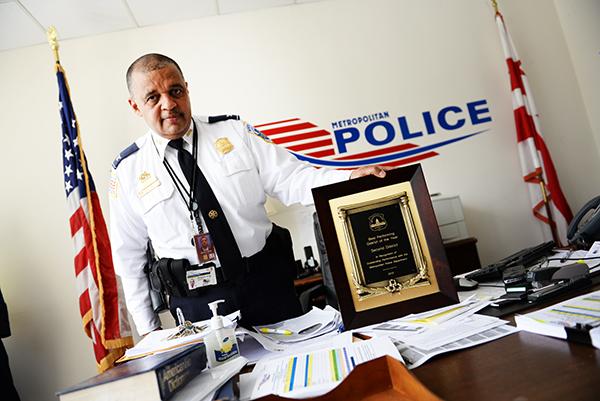During his 25 years in the Metropolitan Police Department, Michael Reese has investigated major crimes across the city, capturing armed drug dealers and violent sexual predators.
But as the second district police commander in charge of Foggy Bottom, Reese now spends most of his time talking to disgruntled neighbors about late-night partying, rowdy campus bars like McFadden’s and disruptions from the neighborhood’s stream of construction projects.
Reese, who was recently named MPD commander of the year, said even working in one of the city’s safest neighborhoods, his role is the same: getting to know neighbors and connecting the dots on crime trends.
“I would like everything to be a warm and fuzzy conversation, but the reality is that it’s not always that way,” Reese said of his conversations with neighbors. “You take it and deal with it.”
Last month, Reese earned the top honor among 3,800-member police force. The second district, which covers much of Northwest D.C., was also named best performing district of the year, with crime down 17 percent.
At the awards ceremony, Metropolitan Police chief Cathy Lanier praised Reese’s role in reducing crime in the second district in both 2012 and 2013.
“He uses strategic tactics to address crime, disorder and traffic issues. He also leads by example by walking foot-beats with his troops, attends roll calls and promotes networking and training for his members,” Lanier said at the ceremony, which drew hundreds to the Gallaudet University auditorium. Last year, Reese charged a group of officers to monitor high-traffic areas like nightclubs on Connecticut Avenue and Dupont Circle.
He’s also taken a hands-on approach with students. Last weekend, Reese came to campus to meet with members of Greek life on campus “about life and being good neighbors.”
“Sometimes residents feel the students are dismissive to their needs and act a little like they’re privileged. That may or may not be true, but you try and work with them,” Reese said.
With more than 25,000 undergraduates from three universities – GW, Georgetown University and American University – under his purview, Reese has also managed communications between three separate campus police forces – a task that involves juggling daily email threads and phone calls with each department.
“I didn’t measure how it was before I got here, but when I got here I knew we had to establish ongoing dialogue,” Reese said. “Boundaries historically work to the advantage of the bad guys. I take a holistic approach.”
University Police Department chief Kevin Hay said Reese sends him daily crime updates and comes to campus for meetings and training sessions with officers, part of Reese’s commitment to make connections between departments so he never misses key details or crime trends.
“He has really upped the game when it comes to the sharing of information,” Hay said. “There’s a lot of collaboration happening on many levels and he really encourages that and so do I.”
Still, Reese acknowledged that the dynamic between UPD and MPD – which was scrutinized last fall when the two forces mishandled a pair of gun threats – has room for improvement.
“Everything isn’t always peaches and cream. We have operating issues we try and work through but you take them one at a time,” Reese said.
He said communication will continue to be a challenge between the two departments, but Reese said he thinks there are new ways to approach the problem. He pointed to GW’s divisive proposal floated by administrators last summer to send officers off campus.
“I don’t think anyone should be opposed to anything, even if you’re a stakeholder, and live there. I wouldn’t be opposed to anything that’s going to help strengthen community ties, compliance and peaceful resolution,” Reese said.
Two other second district police officers also earned best-of-the-year nods at the February award ceremony. Robert Fennell was named officer of the year and Thomas Rosenborg was named detective of the year – honors that are given to one person of each rank across MPD’s seven districts.







